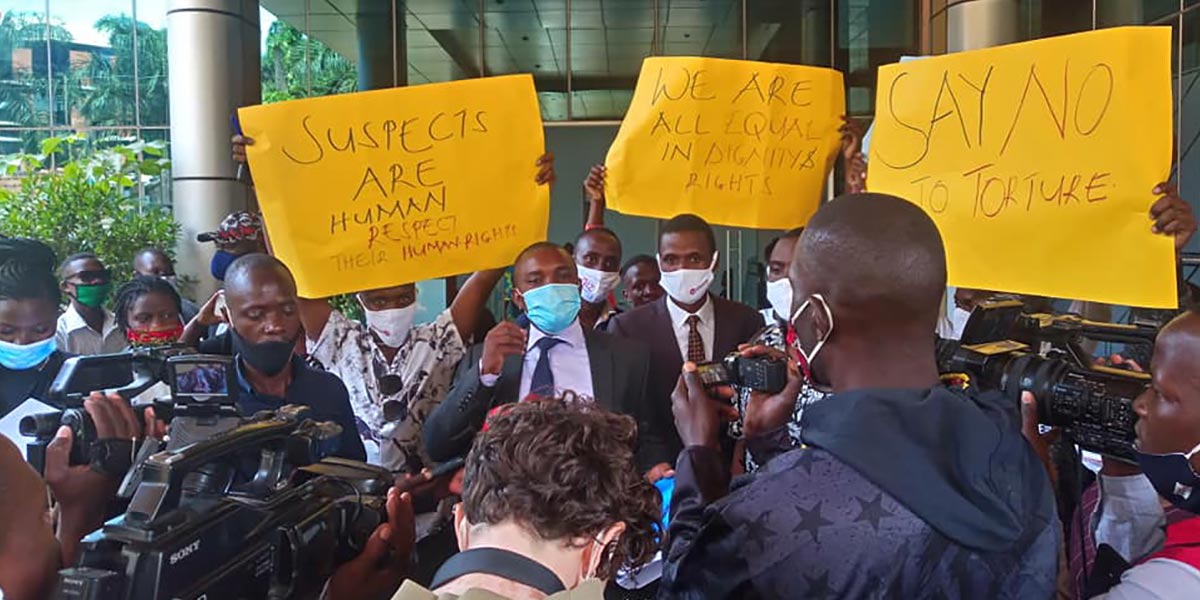Beaten, flogged & burned: 20 LGBTQ youths sue over arrest torture in Uganda

Adrian Jjuuko and supporters outside the High Court in Kampala after filing the lawsuit (Pic: HRAPF)
Twenty young LGBTQ people who were arrested in a raid on a homeless shelter in Uganda in March have accused officials of torture.
On Tuesday, the youths, supported by Human Rights Awareness and Promotion Forum (HRAPF), filed a civil lawsuit at the High Court seeking redress for “torture, inhuman and degrading treatment, discrimination and violation of privacy.”
They claim these acts were perpetrated against them by Hajji Abdul Kiyimba, the chairperson of Kyengera Town Council, during their arrest, and Philimon Woniala, the Deputy Officer in Charge of Kitalya Mini-Maxi Prison, while they were detained.
The 20 were part of a group of 23 youths arrested at a residence where they were temporarily staying in Nkokonjeru ‘A’ Village in Kyengera Town Council on the 29th of March, during an operation that was spearheaded by Hajji Abdul Kiyimba.
“The youths were accused of flouting the Presidential ban on public gatherings because they were many of them in one house, and that residents considered them to be homosexuals since they were all male and were staying in the same house,” said HRAPF in a statement.
It’s alleged that during their arrest they were physically beaten by Hajj Kiyimba, and subjected to insults, as well as searches without a warrant. The 23 were all tied together with ropes and marched off to Nkokonjeru Police Post amidst threats of violence from the crowd that had gathered around them.
“Hajji Kiyimba repeatedly beat me with a cane that he got from one of the Local Defence Unit members. He hit me on the arms and back and I still have scars from those beatings,” said Mukiibi Henry, one of the victims in the case.
Twenty of the individuals were charged with “doing a negligent act likely to spread infection of disease.” They were then sent to Kitalya Mini-Maxi Prison where they were held for over 50 days, before eventually being released with all charges dropped.
HRAPF claims that during their confinement the group “endured a myriad of forms of violence, ranging from taunting, flogging, scalding, subjection to corporal punishment, as well as denial of access to food, sanitary facilities and medication.”
The organisation alleges that, “In one particularly extreme incident, the Deputy Officer in Charge of Kitalya Mini Maxi Prison, Principal Officer, Philimon Woniala personally asked one of the 20 to strip naked, and then burnt him with a burning piece of wood between the thighs.”
During the first 42 days of detention, lawyers from HRAPF were denied access to their clients until the High Court issued an order directing that the lawyers should be allowed to see the youths.
Shortly, thereafter, the Director of Public Prosecutions withdrew charges, and the 20 were released, indicating that there was indeed no justification for their arrest in the first place.
“The fact that they were remanded to prison at the height of the COVID-19 crisis exposed them further to COVID-19 and exacerbated the already congested conditions in prison,” said Dr. Adrian Jjuuko, the Executive Director of HRAPF.
“The prohibition against torture is absolute and non-derogable. As such, regardless of the status of the person on remand, prison authorities, just like other law enforcement agencies, should not violate this most sacrosanct of rights,” added Susan Baluka, HRAPF’s Advocacy and Strategic Litigation Officer.
Under colonial-era legislation criminalising gay sex in Uganda, those found guilty of homosexuality can face life in prison. LGBTQ people also endure societal stigma and discrimination.
Leave a Reply